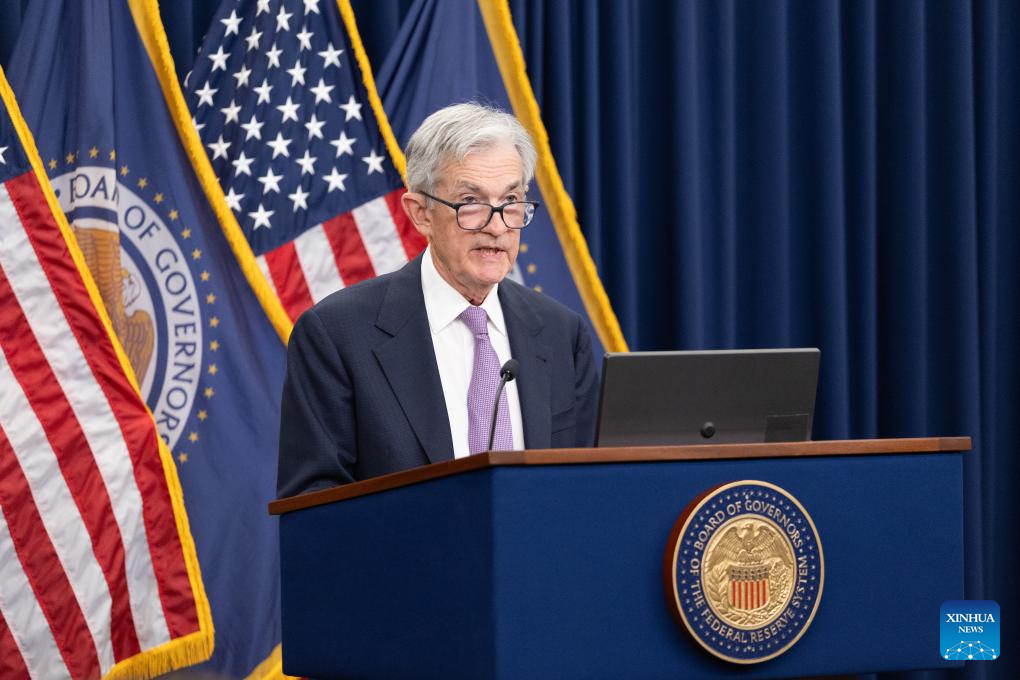
 0 Comment(s)
0 Comment(s) Print
Print E-mail Xinhua, November 8, 2024
E-mail Xinhua, November 8, 2024

U.S. Federal Reserve Chair Jerome Powell attends a press conference in Washington, D.C., the United States, on Nov. 7, 2024. [Photo/Xinhua]
The U.S. Federal Reserve on Thursday slashed interest rates by 25 basis points amid cooling inflation and a weakening labor market, marking the second rate cut in this easing cycle.
"Since earlier in the year, labor market conditions have generally eased, and the unemployment rate has moved up but remains low. Inflation has made progress toward the Committee's 2 percent objective but remains somewhat elevated," the Federal Open Market Committee (FOMC), the central bank's policy-setting body, said in a statement.
In support of its goals, the committee decided to lower the target range for the federal funds rate by 0.25 percentage point to 4.5 percent to 4.75 percent, the statement said.
The Fed's latest decision came after a weak employment report, which showed that U.S. employers added only 12,000 jobs in October, amid a cooling labor market. This slowdown was exacerbated by the strike and impact of recent hurricanes.
The latest report also revised down employment for August and September, to a gain of 78,000 and a gain of 223,000, respectively. With these revisions, employment in the two months combined is 112,000 lower than previously reported.
After its Sept. 17-18 meeting, the central bank slashed the target range for the federal funds rate by 50 basis points, which marked the first rate cut in over four years and signaled the start of an easing cycle.
At a press conference after the Fed's two-day policy meeting, Fed Chair Jerome Powell noted that inflation has eased significantly over the past two years, but core inflation remains somewhat elevated.
Total Personal Consumption Expenditures (PCE) prices -- the Fed's preferred inflation gauge -- rose 2.1 percent over the 12 months ending in September. Excluding the volatile food and energy categories, core PCE prices rose 2.7 percent. "The job is not done on inflation," said Powell.
The Fed chair noted the committee is in the process of "recalibrating" from "fairly restrictive level," noting that target range for the federal funds rate has been lowered by 75 basis points following two consecutive cuts.
Powell acknowledged that despite the economy performing well, Americans are still feeling the effects of high prices. "It takes some years of real wage gains for people to feel better," he said.
The latest FOMC meeting came shortly after the 2024 U.S. presidential election, in which former President Donald Trump -- the Republican candidate -- won by landslide on issues including inflation, immigration and Middle East conflicts.
Powell said that in the near term, the election will have no effect on the Fed's policy decisions.
"Specifically, whether and to what extent those (new) policies would matter for the achievement of our goal variables, maximum employment, and price stability, we don't guess, we don't speculate, and we don't assume," he said.
When asked whether he would step down if President-elect Donald Trump requested his resignation, Powell responded with a firm "no." Asked whether he believed the coming president had the power to fire him, the Fed chair replied, "Not permitted under the law."